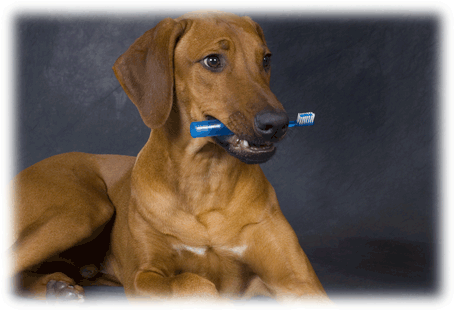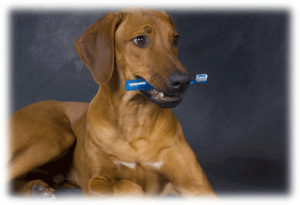February Is “Pet Dental Hygiene” Month
There is a lot to smile about in February with Valentine’s Day just around the corner and only a smooch away. It is only fitting that while your pet pucker up for their Valentine that we celebrate February National Pet Dental Month (coincidence, we think not). So, let’s see those smiles!
Proper oral dental health is not only important for humans, just as brushing our teeth everyday is second nature the same should be true for our pets. Since pet’s lack apposable thumbs to do the teeth brushing themselves. As responsible pet owners it is our duty to help them maintain a healthy smile. So, give your pet something to truly smile about making pet dental health a priority. Just as proper pet nutrition & exercise is important, proper oral care should be as well. But often times our pets teeth can become neglected only to put a huge toll on our pet’s health and our wallets.
Preventive routine teeth cleaning & brushing is an important part of your dog or cats overall health & well being. Year round dental care not only means a healthier pet but less vet bills, so take a few minutes out of your day to brush your pet’s chompers. So, how often should you brush your pets teeth? It is advised that you should brush your dog or cat’s teeth 2-3 times a week. As Sushi and Espy would agree the rewards of clean breath and pain-free healthy smile is truly worth the time and effort. Also, you should take your pet in for a yearly vet physical & oral checkup.
Like anything, prevention is the key! Proper pet oral hygiene helps your dog & cat ward off bad breath, , tarter build, plague, sickness, periodontal gum and heart disease. If proper dental care is not taken seriously, dirty plaque can be the breeding ground for bacteria which can wreak havoc on your dog’s system and cause heart, liver and kidney problems. So, during your grooming sessions & daily teeth brushing check for pain, swellings, redness, abscesses, foul odors (halitosis), and loose or broken teeth in need of immediate vet attention. If your dog is having trouble chewing and swallowing then a dental checkup is in order.
What can you do to keep your pet’s teeth healthy?
1. Yearly Vet Dental Checkup! Have your pet’s teeth examined by your trusted certified vet during his or her yearly physical. At this time a veterinarian will check for signs of bad breath, accumulation of tartar, signs of gum disease and other dental problems. Early detection of tooth, gum & oral disease will give you & your pet less of a toothache in the long run. The dental problem is more likely to be treated properly with a positive outcome.
2. Don’t indulge your pet’s sweet tooth since sugar can encourage bacterial growth.
3. Give your dog a good dental chew or treat to help keep tarter and plaque at bay. Not only are dental chews a great way to keep your dog’s teeth clean but is a way fun away to keep your dog entertained for hours. Our bully sticks & dog chews do the trick!
4. Brush your pet’s teeth on a daily basis (2-3x’s a week). Although dental chews are a great, they should not substitute for a good teeth brushing. Purchase a special pet toothpaste & toothbrush, never use human toothpaste since pet’s can not spit or rinse. The key to successful teeth brushing is to start your pet off slowly for your pet to adapt, be gentle and use positive reinforcement. Treats work wonders! To make teeth brushing easy for the both of you, it is important to acclimate your anxious & often fearful pet. Start by placing toothpaste on your fingers and gently rubbing them in your pet’s mouth. Not only will this get your pet accustomed to the taste of toothpaste and fingers, it will be a lot easier to introduce a toothbrush.
5. Professional Dental Cleaning. At home pet dental cleaning is a must, but nothing compares to a good thorough yearly cleaning by a certified vet during your pets yearly physical. During your pet’s yearly vet checkup your vet should inform you if a professional pet dental cleaning is needed. Consult with your vet further about any specific health risk for your pet prior to procedure since anesthesia will be used. Remember each pet’s circumstance is unique.

